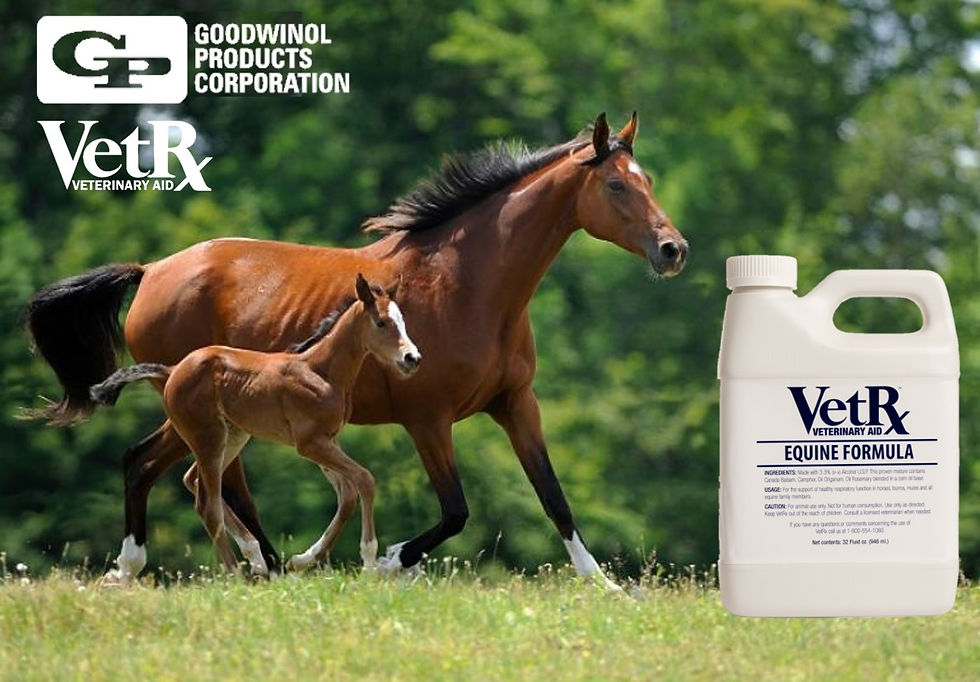Equine Respiratory Health - Disease & Allergens
- Goodwinol Products Corp

- Jan 24, 2022
- 2 min read
Respiratory diseases in horses are very common and have a variety of different causes. Infectious respiratory diseases caused by bacterial and viral infections, for example strangles and influenza, occur in horses of all ages and are particularly common in young horses, especially those kept in larger groups or yards. Non-infectious respiratory diseases are also common and are frequently due to hypersensitivities to allergens in the stable environment, for example inflammatory airway disease in younger horses and equine asthma, previously known as recurrent airway obstruction (RAO), chronic obstructive pulmonary disorder (COPD) or ‘heaves’, in older horses.

Things to Watch For:
Many equine respiratory diseases can look alike, especially in the early stages, and tend to be difficult to diagnose based on common clinical symptoms alone. Your vet will usually need to carry out lab tests to come to an accurate diagnosis. Here are some common signs that further diagnosis is needed:
•Coughing
•Nasal discharge
•Reluctance to work or perform
Horses with infectious causes of respiratory disease may also show:
•Fever
•Loss of appetite
•Increase size of lymph nodes around the head, especially between the mandibles and at the throat latch
Horses with non-infectious respiratory disease, can show increased breathing rate or excessively long recovery times after exercise.

For your horse, the key to a long and healthy life as well a optimal performance is thorough and thoughtful preventative care and treatment.
Equine Allergies
Allergies have become commonly recognized as a culprit of poor respiratory health. Irritation and mucus in the airways can make breathing difficult, especially at a run. Two of the leading causes of breathing issues within performance horses are allergies and exercise-induced pulmonary hemorrhage (EIPH). Bleeding can reduce a horse’s oxygen uptake resulting in decreased performance.
EIPH is also responsible for the development of chronic inflammatory airway disease. Watch for these signs:
Coughing
Itchiness
Hair loss
Runny nose
Watery eyes
While one or two allergens alone may cause a reaction, the more allergens a horse is exposed to, the higher chance there is for a reaction to occur. The most common allergens for horses are: insects, dust, mold, weeds, and grasses, and grooming products.
VetRx Equine Formula
Horses challenged with respiratory deficiencies may benefit from natural supplements or nebulizing treatments such as VetRx. This product helps to alleviate respiratory symptoms.
VetRx Equine Formula is 100% All-Natural and is used to promote healthy upper respiratory function. Recommended for pre-race for respiratory health.

Improves respiratory function
Increases depth of ventilation
VetRx can be used in conjunction with antibiotics
VetRx is all-natural & non-detectable
Like Humans, horses can be exposed to allergens, seasonal coughs, runny noses and develop long-term respiratory problems that affect their overall quality of life and performance.
One ounce of VetRx can be administered orally two or three times daily for sick horses. VetRx can also be administered as a nebulizing treatment.
In some cases the aromatic effect of VetRx can be experienced for several days with just one dose.
Always have VetRx Equine Formula available!
Sources:
Royal Veterinary College, University of London
Tufts Equine Center
Goodwinol Products Corporation





Thanks for this article